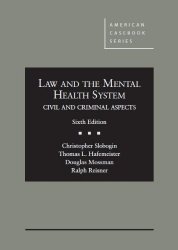$245.00
$245.00
(SAVE Now!)
as of 12/22/2024 (Details)
This text has become the leading casebook on mental health law because of its wide-ranging, in-depth coverage of how the legal system responds to the challenges posed by persons with mental disorders. Continuing the tradition established in previous editions, the book features a sophisticated interdisciplinary treatment of the law and literature relating to the regulation and potential liability of the mental health professions, the government’s authority to deprive people with a mental disorder of their liberty and property and limits on that authority, and the government’s efforts and obligation to provide assistance to people with a mental disorder and to protect them from discrimination. The content of the new edition is immensely enhanced by the addition of two new authors, Thomas L. Hafemeister, J.D., Ph.D., a law professor and psychologist who has taught at numerous law schools, including most recently the University of Virginia, and Douglas Mossman, M.D., a Clinical Professor in the Department of Psychiatry and Behavioral Neuroscience at the University of Cincinnati College of Medicine. They join Christopher Slobogin, J.D., LL.M., the Milton Underwood Professor of Law at Vanderbilt University Law School, who was a co-author on previous editions of the book, and Ralph Reisner, Professor of Law, Emeritus, University of Illinois-Champaign College of Law, one of the initial authors of this casebook. Chapter One of the book provides a primer on mental disorders, mental health treatment and the professionals who provide it, and the complicated mechanisms for financing mental health care. The remaining four chapters of Part I of the book examine the law regulating the mental health professions, including administrative licensing, malpractice law, informed consent doctrine, and confidentiality and privilege rules (including a detailed treatment of the Health Insurance Portability and Accountability Act (HIPAA)). Part II explores how the law affects the liberty and property interests of people with a mental disorder in five chapters entitled “Mental Health Professionals and Expertise,” “Mental Disorder and Criminal Law,” “Civil Commitment,” “Competency Determinations,” and “Post-Commitment Issues.” Part III consists of two chapters that discuss the Individuals with Disabilities Education Act (IDEA), Social Security law, the Americans with Disabilities Act (ADA), and the Fair Housing Act (FHA). Finally, an appendix contains updated diagnostic information from the newly published DSM-5.
Technical Details
No features available.